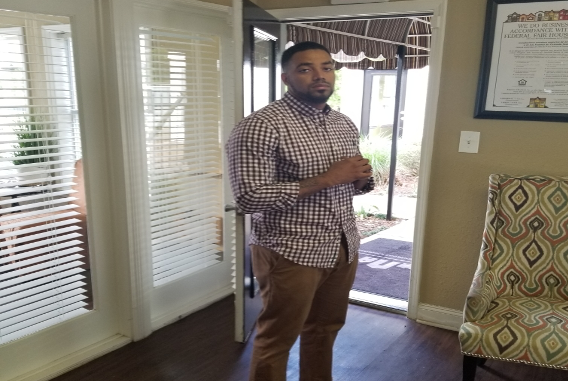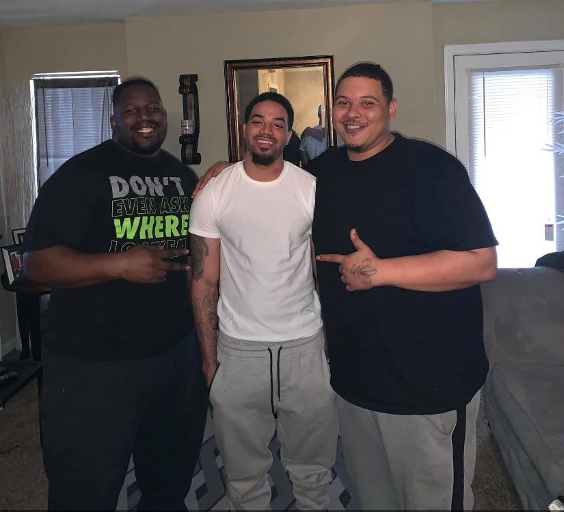
By Othor Cain,
Guest Writer,

Famed gospel singer Donnie McClurkin penned the song ‘Stand’ which famously asks,
What do you do when you’ve done all you can
And it seems like it’s never enough?
And what do you say
When your friends turn away
And you’re all alone?
Tell me, how do you handle the guilt of your past?
Tell me, how do you deal with the shame?
And how can you smile while your heart has been broken
And filled with pain?
Tell me what do you give when you’ve given your all?
Seems like you can’t make it through.
McClurkin responds with:
Child, you just stand when there’s nothing left to do
You just stand, watch the Lord see you through
Yes, after you’ve done all, you can. You just stand.
For Joshua Archie, the lyrics to that song go beyond just standing. It also means fighting. Fighting until he has nothing left to fight with.
“I want to know that I gave everything I had and as long as I know that [that I did], whatever happens, I will be ok,” said Archie.
Archie, who had just turned 21 back in 2012 at the time of the alleged incident, is fighting to overturn his conviction of capital murder and conspiracy to commit armed robbery. He is charged with the shooting death of 68-year-old Robert Adams during a robbery at the Party City store in Ridgeland, MS in 2012.
After two mistrials, Archie, who is now 32, was released in February 2019 on a $250K bond. He was rearrested in August 2021, after losing his third trial when a Madison County jury found him guilty.
Last month, while the state’s highest court upheld his conviction, all nine justices agreed that Archie’s alibi evidence warranted the giving of the alibi instructions. Where they disagreed is on a technicality called ‘harmless error.’ [More on harmless error later in the story].
Archie differs with the opinion to uphold his conviction and so does Hunter Aiken, an appellate attorney with the Mississippi Office of Public Defenders. One of Archie’s main points he attempted to convey in his appeal was that Circuit Judge Steve Ratcliff was wrong for refusing his request to include jury instructions on his “alibi theory of defense’ and on ‘reasonable doubt.” Aiken supports that theory wholeheartedly, even writing in his brief, “The trail court erred in refusing to instruct Archie’s jury on his alibi theory of defense. Viewing the conflicting evidence in the light most favorable to Archie and drawing all reasonable inferences in his favor, there was a sufficient evidentiary basis to support the instruction and for a reasonable juror to find facts in accordance with Archie’s alibi theory. Accordingly, the trail court erred in refusing to instruct the jury on alibi, and this Court should reverse and remand this case for a new trial.

Aiken supports the evidence Archie presented, including phone device, tower service and records that pinged Archie’s phone being at his mother’s apartment in Northeast Jackson at the time of the incident and not at Party City in Ridgeland. However, the expert phone witness was not able to share information in the third trial.
Still fighting.
Last week Archie filed a motion for a rehearing, which is rarely granted. But his faith is strong. “I believe if I continue my pursuit and stay focused on Christ that my outcome will be favorable,” Archie said. He strongly believes those errors should be investigated and that he should be granted a new trial.
Archie is relying on Rule 40 of the Mississippi Rules of Appellate Procedure that provides “the motion for rehearing should be used to call attention to specific errors of law or fact which the opinion is though to contain[.] Specifically Archie argues that the Supreme Court failed to address the issue regarding the trial court’s failure to grant the alibi instruction and that the facts noted in its opinion is not sufficient to affirm the appellant’s appeal.

Aiken also supports this refiling and continued in his brief: “Archie offered instruction D-5, which would have instructed the jury on his alibi theory of defense and provided as follows: The Court instructs the jury that Mr. Archie has raised the defense of alibi to the charges against him. Alibi means not being at the scene of the crime when the crime was committed, and it is a legal defense. In other words, Mr. Archie has asserted that he was somewhere else when the crime was committed.
Mr. Archie does not have to prove beyond a reasonable doubt that he was somewhere else when the crimes were committed. The State must prove beyond a reasonable doubt that Mr. Archie was present and did commit the crime of capital murder.
If you have a reasonable doubt whether Mr. Archie was present on the date and time when this crime was committed, then you must find him not guilty.”
Archie strongly believes that the Supreme Court used what is known as ‘Harmless Error’ to affirm its decision. In United States law, a harmless error refers to a ruling by a trial judge that, although mistaken, does not meet the burden for a losing party to reverse the original decision of the trier of fact on appeal or warrant a new trial. Essentially, even if an error occurred during the trial, it won’t necessarily invalidate the conviction if the evidence of guilt is overwhelming. However, this doctrine has been criticized for sometimes allowing tainted convictions to stand, as illustrated by cases like that of Alejandro Garcia-Lagunas. In his case, despite the government’s reliance on racist testimony, the court upheld his conviction, deeming the constitutional error “harmless.”
“The Supreme Court ruled 5-4 in my case and those dissenting said the harmless error ruling was used inappropriately,” Archie said. Archie is hoping his new filing will garner traction and attention and feels the four justices that dissented, people should listen and hear them.
Justice Coleman wrote the dissenting brief for the Supreme Court. Writing in part: “As the United States Court of Appeals for the Fifth Circuit has written, “A defendant is always entitled to have his theory of the case, if it could amount to a lawful defense, fairly submitted to the consideration of the jury,” United States vs Flom, 558 F.2d1179,1185 (5th Cir.1977).
Error is harmless when it is trivial, formal, or merely academic, and not prejudicial to the substantial rights of the party assigning it and where it in no way affects the final outcome of the case….”Cath, Diocese of Natchez-Jackson v. Jaquith, 224 So. 2d 216, 221.
Throughout its harmless error analysis, the majority views the evidence in the light most favorable to the State and treats Archie’s alibi evidence as though it cannot be believed. The majority errs by doing so.”
As Archie continues to fight, The Mississippi Link will continue following this story and bring you additional updates as they are warranted.

Be the first to comment